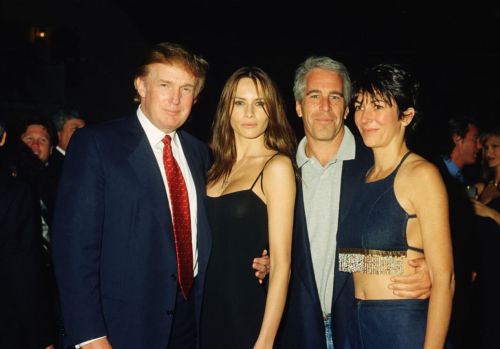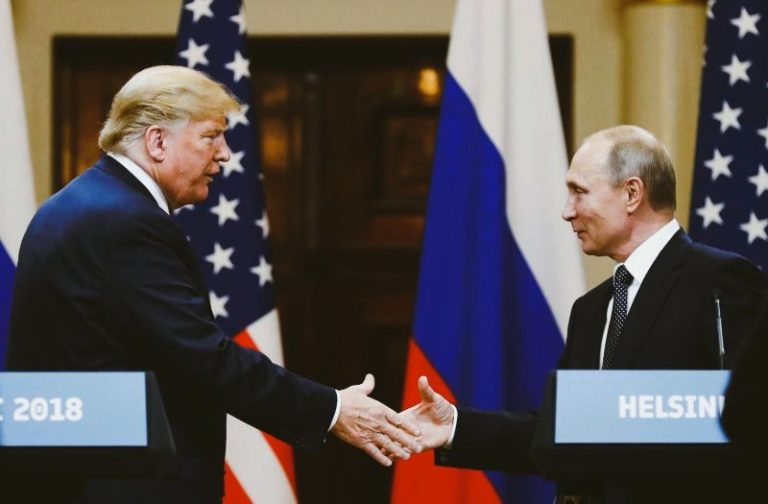

For Trump, the new disclosures strike at a core narrative he has relied on for years, that he alone stands apart from a corrupt elite.

By Matthew A. McIntosh
Public Historian
Brewminate
Introduction
The House Oversight Committee’s latest release of documents tied to Jeffrey Epstein has reignited questions about President Donald Trump’s long-standing connection to the disgraced financier. The trove, made public on Tuesday, includes a series of emails that appear to place Trump in Epstein’s orbit well after their supposed falling-out. The messages suggest Trump maintained contact with Epstein’s network and was aware of women and girls trafficked through his properties.
Trump responded on his social media platform early Wednesday, accusing Democrats of “trying to raise Epstein again” to divert from the political fallout of the ongoing government shutdown. Yet even among Trump’s own supporters, frustration has grown over his decision not to release all materials related to Epstein as previously promised. Several Republican lawmakers privately expressed concern that the disclosures could erode trust within their base and further expose the party’s vulnerability ahead of 2026.
The emails, part of an ongoing bipartisan review of Epstein’s financial and political ties, have renewed public outrage over the decades-long protection extended to powerful men linked to the scandal. For Trump, already found liable for sexual abuse in a civil trial last year, the new evidence reinforces a narrative of predation and impunity that refuses to fade.
What the Documents Show
The House Oversight Committee’s release includes hundreds of pages of correspondence, financial ledgers, and internal notes recovered from Epstein’s encrypted email archives. Among the most notable revelations are two exchanges directly referencing Donald Trump. In one 2011 message, Epstein told Ghislaine Maxwell that Trump “spent hours with [victim] at my house.” The email, dated years after Trump claimed to have severed ties with Epstein, contradicts earlier statements suggesting their relationship ended in the mid-2000s.
Another message appears to show Epstein boasting to author Michael Wolff in 2019 that Trump was “well aware” of the young women visiting his homes and had once asked Maxwell to “stop bringing girls around.” The exchange came just months before Epstein’s arrest, suggesting that the financier still viewed Trump as part of his social and political network.
The newly released records span more than a decade and contain dozens of references to Trump’s visits, phone calls, and campaign contributions connected to Epstein’s business entities. The committee emphasized that while some of the materials remain under review for redaction, the verified exchanges have been cross-checked through metadata and prior court filings.
The documents also highlight the extent to which Epstein’s influence penetrated financial and political institutions. Investigators discovered overlapping communications between Epstein’s office and major political donors during Trump’s 2016 campaign period, raising new questions about whether his circle benefited from Epstein’s network of private financiers. Committee officials said more records will be released in the coming weeks as digital reconstruction of Epstein’s hard drives continues.
Taken together, the emails depict not a distant acquaintance but an enduring familiarity, one that persisted well beyond public denials. For a president already struggling to contain ethical crises within his administration, the renewed scrutiny over Epstein’s correspondence represents both a political and moral reckoning that extends beyond party lines.
Trump’s Reaction and Political Context
Within hours of the release, President Trump took to his social media platform, calling the renewed focus on Epstein “a Democrat distraction from the damage they’ve done.” His post attempted to frame the disclosures as partisan maneuvering amid the ongoing government shutdown. Yet the timing of his response underscored how politically fraught the issue has become, drawing criticism not only from Democrats but from within his own ranks.
Several Republican lawmakers privately expressed frustration over Trump’s refusal to follow through on his earlier promise to declassify all Epstein-related documents. One GOP strategist described the situation as “a credibility problem that cuts deeper than policy,” reflecting concern that Trump’s effort to dismiss the revelations may backfire with voters who expected transparency. The discontent is particularly visible among his populist supporters, some of whom have voiced anger on social media, accusing him of shielding powerful allies while claiming to oppose the establishment.
Trump’s attempt to downplay the findings has only amplified scrutiny. The committee’s release came as bipartisan calls for accountability intensified, with both Republican and Democratic members of the House Oversight Committee emphasizing that the public has a right to know the extent of Epstein’s connections to figures in power. For Trump, that means facing renewed questions about his long-standing proximity to one of the most notorious abusers in modern history.
Meanwhile, several civil rights groups have urged the Justice Department to reopen inquiries into how Epstein’s associates were treated by federal investigators in prior years. Their argument centers on accountability, not only for Epstein’s crimes but for those who enabled him, protected him, or remained silent. For a president already found liable in a civil case involving sexual abuse, the optics of this renewed exposure are politically devastating.
Trump’s insistence that the story will “fade away” stands in sharp contrast to the gathering momentum behind the investigation. As the shutdown drags on and his administration struggles to project control, the resurfacing of Epstein’s shadow has once again placed Trump at the intersection of scandal and power, a position from which he has rarely emerged unscathed.
Legal and Ethical Stakes
The new emails land in a legal landscape where a jury has already found President Donald Trump liable for sexually abusing and defaming E. Jean Carroll in a civil case, a verdict upheld on appeal and followed by additional damages in a later defamation trial. The Associated Press and Reuters have documented the liability finding and subsequent appellate outcomes, which remain part of the public record
Against that backdrop, the Epstein correspondence carries ethical weight that goes beyond political optics. The messages do not prove criminal conduct on their own, but they appear to contradict prior efforts to distance Trump from Epstein and they sharpen questions about what the White House will disclose. The committee’s release underscores a duty to transparency that applies irrespective of party control.
There is also a governance concern. Presidents set standards for executive branch integrity. When documents surface that appear to place a sitting president closer to a known trafficker’s circle than previously acknowledged, it pressures institutions to respond with clear disclosures and credible processes. That is why civil society groups are calling for fuller review, and why bipartisan members have pressed for a vote to force broader publication of the files.
Finally, there is a public trust dimension. The administration has framed the renewed focus on Epstein as a partisan diversion, but the release is driving scrutiny within Trump’s own coalition over unmet promises to make all related material public. Trust erodes when transparency is delayed, and it erodes faster when earlier commitments appear to be reversed.
Why It Will Not Go Away
The Epstein documents have reignited a narrative that Trump can no longer control. Far from fading, the disclosures have amplified public demand for accountability. Committee members from both parties have expressed determination to continue releasing materials, arguing that transparency is the only way to restore public confidence in government oversight. Their statements reflect a growing consensus that the Epstein case represents not merely a historical scandal, but an ongoing test of institutional integrity.
The reaction outside Washington has been equally intense. Prominent conservative voices, including media figures who once defended Trump, are openly questioning his decision to withhold full disclosure of the Epstein files. In online forums and conservative networks, frustration has shifted from disbelief to disappointment, signaling a rare fracture within his political base. The shift matters because it undermines one of Trump’s most effective narratives: that his support remains immune to scandal.
At the same time, survivors’ advocates and watchdog groups have seized the moment to renew pressure for investigations into Epstein’s broader network. New civil filings are being prepared against Epstein’s remaining estate and alleged collaborators, some of whom maintain political ties. These actions ensure that the story continues to generate evidence and legal developments beyond the committee hearings, keeping it in public view regardless of Trump’s efforts to discredit it.
Moreover, the scale of the archive virtually guarantees prolonged attention. Investigators are still processing thousands of unreleased messages, phone logs, and transactional records, suggesting that the latest revelations may represent only a fraction of what remains. Each new batch of disclosures will invite further scrutiny of who knew what, and when.
Politically, the longer the story lingers, the harder it becomes to separate Trump’s personal conduct from his presidency. The Oversight Committee’s findings have revived an uncomfortable truth about the modern political system: accountability for the powerful often arrives slowly, but it arrives nonetheless. In that sense, the Epstein revelations are less a diversion than a reckoning, one that neither Trump nor his allies can easily dismiss.
Conclusion
The release of Epstein’s emails is not just another political flare-up; it’s a reminder of how power protects itself until public exposure forces a reckoning. The material shows that Jeffrey Epstein’s influence stretched into the highest tiers of political and social life, long after he was first accused of trafficking and abuse. That reach, now under renewed scrutiny, implicates a system built to shield privilege rather than confront it.
For President Trump, the new disclosures strike at a core narrative he has relied on for years, that he alone stands apart from a corrupt elite. Instead, the record continues to tether him to the very structures of exploitation and power he claims to oppose. His attempts to frame the controversy as partisan distraction have failed to halt the momentum of inquiry, and each denial only highlights the gravity of the allegations that persist.
More documents will follow in the coming weeks, potentially revealing additional correspondence between Epstein and figures in Trump’s circle. The story, like the scandal it revives, continues to widen, and no administration statement has yet disputed the authenticity of the communications already made public.
What remains now is not whether this story will fade, but how deeply it will reshape the political landscape. The Epstein revelations remind Americans that proximity to power often means proximity to secrecy, and that accountability, when it comes, is never on the schedule of those who fear it most.
Originally published by Brewminate, 11.13.2025, under the terms of a Creative Commons Attribution-NonCommercial-NoDerivatives 4.0 International license.


